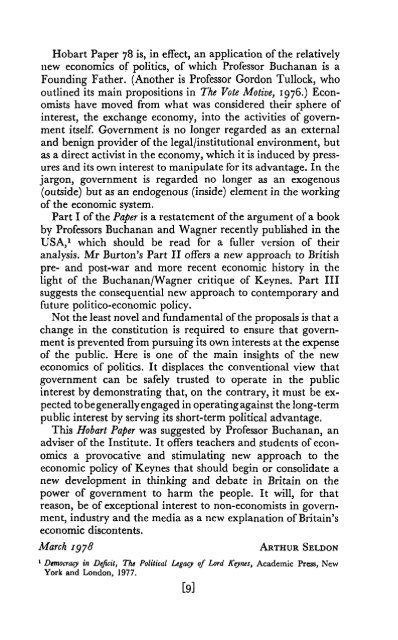THE CONSEQUENCES OF MR KEYNES.pdf - Institute of Economic ...
THE CONSEQUENCES OF MR KEYNES.pdf - Institute of Economic ...
THE CONSEQUENCES OF MR KEYNES.pdf - Institute of Economic ...
You also want an ePaper? Increase the reach of your titles
YUMPU automatically turns print PDFs into web optimized ePapers that Google loves.
Hobart Paper 78 is, in effect, an application <strong>of</strong> the relatively<br />
new economics <strong>of</strong> politics, <strong>of</strong> which Pr<strong>of</strong>essor Buchanan is a<br />
Founding Father. (Another is Pr<strong>of</strong>essor Gordon Tullock, who<br />
outlined its main propositions in The Vote Motive, 1976.) Economists<br />
have moved from what was considered their sphere <strong>of</strong><br />
interest, the exchange economy, into the activities <strong>of</strong> government<br />
itself. Government is no longer regarded as an external<br />
and benign provider <strong>of</strong> the legal/institutional environment, but<br />
as a direct activist in the economy, which it is induced by pressures<br />
and its own interest to manipulate for its advantage. In the<br />
jargon, government is regarded no longer as an exogenous<br />
(outside) but as an endogenous (inside) element in the working<br />
<strong>of</strong> the economic system.<br />
Part I <strong>of</strong> the Paper is a restatement <strong>of</strong> the argument <strong>of</strong> a book<br />
by Pr<strong>of</strong>essors Buchanan and Wagner recently published in the<br />
USA, 1 which should be read for a fuller version <strong>of</strong> their<br />
analysis. Mr Burton's Part II <strong>of</strong>fers a new approach to British<br />
pre- and post-war and more recent economic history in the<br />
light <strong>of</strong> the Buchanan/Wagner critique <strong>of</strong> Keynes. Part III<br />
suggests the consequential new approach to contemporary and<br />
future politico-economic pohcy.<br />
Not the least novel and fundamental <strong>of</strong>the proposals is that a<br />
change in the constitution is required to ensure that government<br />
is prevented from pursuing its own interests at the expense<br />
<strong>of</strong> the public. Here is one <strong>of</strong> the main insights <strong>of</strong> the new<br />
economics <strong>of</strong> politics. It displaces the conventional view that<br />
government can be safely trusted to operate in the public<br />
interest by demonstrating that, on the contrary, it must be expected<br />
to be generally engaged in operating against the long-term<br />
public interest by serving its short-term political advantage.<br />
This Hobart Paper was suggested by Pr<strong>of</strong>essor Buchanan, an<br />
adviser <strong>of</strong>the <strong>Institute</strong>. It <strong>of</strong>fers teachers and students <strong>of</strong> economics<br />
a provocative and stimulating new approach to the<br />
economic pohcy <strong>of</strong> Keynes that should begin or consolidate a<br />
new development in thinking and debate in Britain on the<br />
power <strong>of</strong> government to harm the people. It will, for that<br />
reason, be <strong>of</strong> exceptional interest to non-economists in government,<br />
industry and the media as a new explanation <strong>of</strong> Britain's<br />
economic discontents.<br />
March igj8<br />
ARTHUR SELDON<br />
1 Democracy in Deficit, The Political Legacy <strong>of</strong> Lord Keynes, Academic Press, New<br />
York and London, 1977.<br />
[9]












